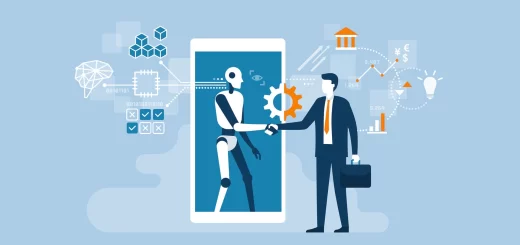How AI is Reshaping Business in 2020: Automation, Decision-Making, and the Future of Work

Artificial Intelligence (AI) is no longer a futuristic concept—it is a critical driver of business transformation in 2020. From automating repetitive tasks to enhancing decision-making, AI is helping businesses improve efficiency, reduce costs, and stay competitive in an increasingly digital world.
The COVID-19 pandemic has further accelerated AI adoption, as companies adapt to remote work, shifting consumer demands, and supply chain disruptions. AI-powered tools are enabling organizations to streamline operations, optimize logistics, and enhance customer experiences.
As we move through 2020, businesses that successfully integrate AI into their strategies are gaining a competitive edge. This article explores how AI is reshaping industries, the challenges businesses face in AI adoption, and what the future holds for AI in business.
1. AI-Powered Automation: Transforming Business Operations
One of AI’s biggest contributions to business is automation. By leveraging AI-driven Robotic Process Automation (RPA) and machine learning models, companies can eliminate repetitive tasks, reduce human error, and increase productivity.
A. AI in Workforce Automation
- AI-powered chatbots and virtual assistants are handling customer inquiries, reducing response times and cutting customer support costs.
- RPA tools like UiPath, Automation Anywhere, and Blue Prism are streamlining back-office operations, automating invoicing, payroll, and data processing.
- AI-driven document processing is allowing businesses to extract insights from contracts, emails, and reports with minimal human intervention.
With automation freeing employees from mundane tasks, companies can reallocate human resources to higher-value strategic roles, fostering innovation and growth.
B. AI in Supply Chain & Logistics
- AI-powered demand forecasting models help businesses predict consumer trends, supply chain disruptions, and inventory needs.
- Companies like Amazon and Walmart are using AI-driven warehouse robots to optimize logistics and reduce delivery times.
- AI algorithms are optimizing route planning for delivery fleets, cutting fuel costs and improving efficiency.
AI-driven automation is revolutionizing supply chain management, making operations more resilient, adaptable, and cost-effective.
2. AI in Business Intelligence: Smarter Decision-Making
Businesses are generating massive amounts of data, and AI is helping organizations turn that data into actionable insights. AI-driven business intelligence (BI) tools are enhancing decision-making, reducing risks, and improving overall efficiency.
A. Predictive Analytics for Business Strategy
- AI models analyze historical data to predict market trends, consumer behavior, and sales performance.
- Retailers are using AI-powered recommendation engines (like those used by Netflix and Amazon) to increase conversion rates and customer retention.
- Financial institutions are leveraging AI to detect fraudulent transactions in real-time, reducing financial risks.
B. AI in Risk Management & Fraud Detection
- AI-powered credit scoring models assess customer risk profiles more accurately than traditional methods.
- AI-driven fraud detection tools use machine learning to identify suspicious patterns in banking transactions.
- Insurance companies are using AI to analyze claims, detect anomalies, and automate approvals, reducing processing times.
AI is reshaping how businesses make data-driven decisions, allowing them to react faster, reduce uncertainty, and capitalize on emerging opportunities.
3. AI in Customer Experience: Personalization and Engagement
Customer expectations are evolving, and AI is playing a key role in personalizing interactions, improving customer service, and increasing engagement.
A. AI-Driven Personalization
- AI-powered recommendation engines are helping e-commerce businesses deliver personalized product suggestions, increasing sales and customer satisfaction.
- Streaming services like Spotify and Netflix use AI to curate personalized content recommendations, enhancing user experience.
- AI-driven marketing tools analyze user data to customize email campaigns, advertisements, and promotions.
B. Conversational AI & Chatbots
- AI-powered chatbots like Drift, Intercom, and HubSpot Chat are handling real-time customer interactions, improving response times and reducing human workload.
- Virtual assistants like Google Assistant and Amazon Alexa are enabling businesses to automate voice-based interactions with customers.
- AI-driven customer service tools analyze sentiment in customer interactions, allowing businesses to improve service quality and enhance customer retention strategies.
By leveraging AI for customer insights and engagement, businesses are creating more personalized, seamless, and effective experiences for consumers.
4. AI’s Role in Remote Work and Virtual Collaboration
With businesses transitioning to remote work due to the COVID-19 pandemic, AI has become a key enabler of virtual collaboration, cybersecurity, and workflow optimization.
A. AI in Virtual Meetings and Productivity Tools
- AI-powered tools like Otter.ai and Fireflies.ai provide real-time transcription and meeting summaries, improving productivity.
- AI-driven project management tools analyze workloads and optimize task allocation for remote teams.
- AI-powered recruitment platforms streamline virtual hiring, using machine learning to screen candidates efficiently.
B. AI in Cybersecurity
- AI-driven cybersecurity tools use machine learning algorithms to detect and respond to cyber threats in real-time.
- AI models monitor network activity and prevent unauthorized access, securing remote work environments.
- AI-powered fraud detection systems identify suspicious activities in real-time, reducing financial losses.
As businesses embrace remote work and digital collaboration, AI is ensuring that teams stay secure, connected, and productive.
5. Challenges in AI Adoption for Businesses
While AI adoption is accelerating, businesses still face key challenges in implementation, ethics, and workforce adaptation.
- High Implementation Costs: AI-driven solutions require significant investment in infrastructure and expertise.
- Data Privacy Concerns: AI relies on vast amounts of data, raising privacy and regulatory compliance challenges.
- Workforce Disruption: As AI automates tasks, companies must focus on reskilling employees to work alongside AI.
Despite these challenges, companies that successfully integrate AI into their business models will gain long-term competitive advantages.
Final Thoughts: AI’s Role in the Future of Business
AI is no longer optional—it is essential for businesses looking to thrive in an increasingly digital economy. From automation and predictive analytics to customer engagement and cybersecurity, AI is transforming industries in unprecedented ways.
As we move through 2020 and beyond, businesses that invest in AI-powered solutions, ethical AI development, and workforce reskilling will be better positioned for success. The question is no longer “Should businesses adopt AI?” but rather “How fast can they integrate AI to stay ahead?”
With continuous advancements in AI, we are only beginning to see the full potential of AI-driven business transformation—and the future looks promising.




